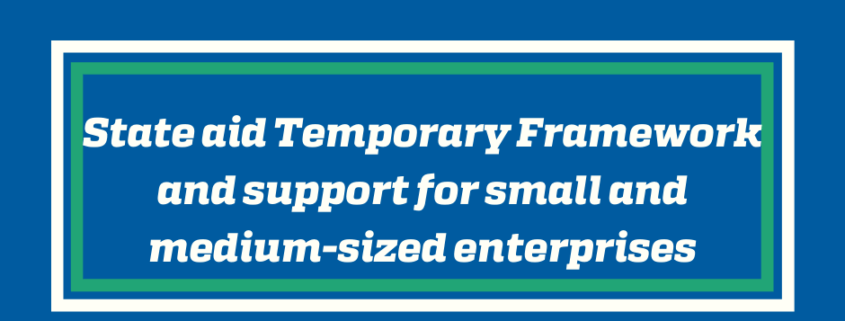Written question to the European Commission
The State aid Temporary Framework has enabled Member States to provide all the liquidity that businesses need to face the consequences of the COVID‑19 pandemic. Due to the current situation, the framework still needs to be improved and extended to support businesses, especially small and medium-sized enterprises (SMEs), on the road to recovery. SMEs are still particularly exposed and some sectors are still suffering from administrative closures. All the temporary framework sections have been extended until June 2021 and recapitalisation support will now be available until September 2021.
1. Would the Commission consider an extension until 31 December 2021, since it is still impossible to predict when SMEs will be able to resume their activities in full?
2. In view of the continuing uncertainty surrounding the health situation, which is holding back recovery and forcing some firms to suspend or limit their activities, does the Commission intend to extend the deadlines for the repayment of State aid by extending the duration of aid in the form of loan guarantees and subsidised interest rates to ten years instead of the six years initially planned?
Answer given by Commissioner Vestageron behalf of the European Commission
1. As the coronavirus outbreak persists longer than hoped for, the Commission needs to keep making sure that Member States can provide businesses with the necessary support to see it through. On 28 January 2021, the Commission therefore adopted a fifth amendment of the Temporary Framework providing, among other things, for the prolongation of that framework until 31 December 2021. Furthermore, taking into account the continued economic uncertainty and prolonged government measures to limit economic activity in order to stop the spread of the virus, the amendment also increases the ceilings set out in the Temporary Framework for certain support measures:
a. With regard to limited amounts of aid granted under the Temporary Framework, the previous ceilings per company are now effectively doubled (taking into account the availability of de minimis support). The new ceilings are EUR 225 000 per company active in the primary production of agricultural products, EUR 270 000 per company active in the fishery and aquaculture sector, and EUR 1.8 million per company active in all other sectors. As before, these can be combined with de minimis aid of up to EUR 200 000 per company (up to EUR 30 000 per company operating in the fishery and aquaculture sector and up to EUR 25 000 per company operating in the agriculture sector) over a period of three financial years, subject to complying with the requirements of the relevant de minimis regulations.
b. For companies especially hit by the coronavirus crisis, with turnover losses of at least 30% during the eligible period compared to the same period of 2019, the State can contribute to the part of the fixed costs of companies that are not covered by their revenues, in an amount up to EUR 10 million per company (previously EUR 3 million).
2. As before, the duration of loan guarantees and subsidised interest rates granted under the Temporary Framework can be modulated with other characteristics of those measures, so that, for example, a lower guarantee coverage could offset a longer duration, which could go up to eight years.




Leave a Reply
Want to join the discussion?Feel free to contribute!